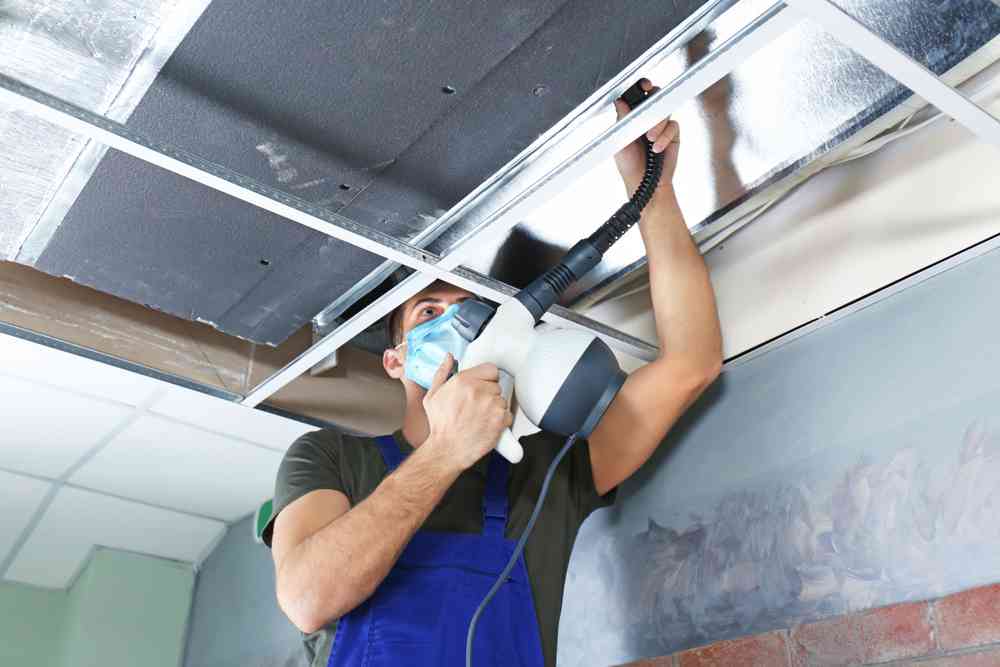DIY Kitchen Exhaust Clean Tips

Keeping your kitchen exhaust clean is essential for maintaining a healthy and safe environment in your home. Over time, grease and grime can build up in your kitchen exhaust system, leading to reduced efficiency and increased fire risk. While professional cleaning services are available, they can be costly. Fortunately, there are several DIY tips and techniques you can use to clean your kitchen exhaust effectively. In this article, we will explore these tips and provide valuable insights to help you keep your kitchen exhaust clean and functioning optimally.
Ontario-wide Kitchen Exhaust and Hood Cleaning – Best prices and service guaranteed.
The Importance of a Clean Kitchen Exhaust
Before diving into the DIY tips, it is crucial to understand why keeping your kitchen exhaust clean is so important. The kitchen exhaust system plays a vital role in removing smoke, odors, and airborne contaminants from your kitchen. It also helps to prevent the buildup of grease and grime on your kitchen surfaces, which can be a breeding ground for bacteria and other harmful microorganisms.
Ontario-wide Kitchen Exhaust and Hood Cleaning – Best prices and service guaranteed.
A dirty kitchen exhaust can lead to a range of issues, including:
- Reduced air quality: A clogged exhaust system can recirculate smoke, odors, and contaminants back into your kitchen, compromising the air quality.
- Increased fire risk: Grease buildup in the exhaust system can become highly flammable, increasing the risk of a kitchen fire.
- Decreased efficiency: When the exhaust system is clogged, it has to work harder to remove smoke and odors, leading to reduced efficiency and increased energy consumption.
- Unpleasant odors: A dirty exhaust system can result in lingering odors in your kitchen, making it less inviting for cooking and entertaining.
Now that we understand the importance of a clean kitchen exhaust, let’s explore some DIY tips to help you keep it in top condition.
Ontario-wide Kitchen Exhaust and Hood Cleaning – Best prices and service guaranteed.
1. Regular Cleaning
The first and most crucial tip is to establish a regular cleaning routine for your kitchen exhaust. Regular cleaning will prevent the buildup of grease and grime, ensuring that your exhaust system functions optimally. Here’s how you can do it:
- Remove and clean the filters: Start by removing the filters from your exhaust hood. These filters are designed to trap grease and should be cleaned regularly. Soak them in warm, soapy water and scrub gently to remove any grease buildup. Rinse thoroughly and let them dry before reinstalling.
- Clean the exhaust hood: Use a degreaser or a mixture of vinegar and water to clean the exterior of the exhaust hood. Pay special attention to the areas with visible grease buildup. Wipe down the hood with a clean cloth or sponge.
- Clean the exhaust fan: The exhaust fan can accumulate grease and dust over time. Use a vacuum cleaner or a brush to remove any debris. You can also wipe it down with a damp cloth to remove any remaining grease.
- Check and clean the ductwork: If possible, inspect the ductwork for any visible signs of grease buildup. Use a long-handled brush or a duct cleaning tool to remove any accumulated grease. If the ductwork is difficult to access, consider hiring a professional duct cleaning service.
Ontario-wide Kitchen Exhaust and Hood Cleaning – Best prices and service guaranteed.
2. Use Natural Cleaning Solutions
When cleaning your kitchen exhaust, it is best to use natural cleaning solutions that are safe for both you and the environment. Here are some natural cleaning solutions you can try:
- Vinegar and water: Mix equal parts of vinegar and water in a spray bottle. Spray the mixture onto the greasy areas of your exhaust hood and wipe it down with a clean cloth or sponge. Vinegar is a natural degreaser and will help break down the grease.
- Baking soda paste: Make a paste by mixing baking soda with water. Apply the paste to the greasy areas of your exhaust hood and let it sit for a few minutes. Scrub gently with a sponge or brush to remove the grease. Rinse thoroughly with water.
- Lemon juice: Lemon juice is another natural degreaser. Squeeze fresh lemon juice onto a sponge or cloth and use it to wipe down the greasy areas of your exhaust hood. Rinse with water to remove any residue.
Ontario-wide Kitchen Exhaust and Hood Cleaning – Best prices and service guaranteed.
3. Pay Attention to the Small Details
When cleaning your kitchen exhaust, it is essential to pay attention to the small details that are often overlooked. Here are some areas you should focus on:
- Light fixtures: Grease and grime can accumulate on the light fixtures above your exhaust hood. Turn off the power and remove the light covers. Clean them with warm, soapy water and let them dry before reinstalling.
- Control knobs and buttons: The control knobs and buttons on your exhaust hood can also collect grease and grime. Use a damp cloth or sponge to wipe them down regularly.
- Wall and ceiling: Over time, grease and smoke can leave stains on your kitchen walls and ceiling. Use a mild detergent or a mixture of vinegar and water to clean these surfaces. Scrub gently with a sponge or brush and rinse with water.
Ontario-wide Kitchen Exhaust and Hood Cleaning – Best prices and service guaranteed.
4. Consider Professional Cleaning
While DIY cleaning can be effective, there may be instances where professional cleaning is necessary. If you notice excessive grease buildup, strange odors, or reduced airflow in your kitchen exhaust, it may be time to call in the professionals. Professional cleaning services have the expertise and equipment to thoroughly clean your exhaust system, ensuring optimal performance and safety.
Ontario-wide Kitchen Exhaust and Hood Cleaning – Best prices and service guaranteed.
Keeping your kitchen exhaust clean is essential for maintaining a healthy and safe environment in your home. Regular cleaning, the use of natural cleaning solutions, paying attention to small details, and considering professional cleaning when necessary are all key tips to keep in mind. By following these DIY tips, you can ensure that your kitchen exhaust system functions optimally, reduces fire risk, and maintains good air quality in your kitchen. So, roll up your sleeves, put on some gloves, and get ready to give your kitchen exhaust the cleaning it deserves!
Learn more about “Do-It-Yourself Kitchen Exhaust Cleaning” here.
Frequently Asked Questions about DIY Kitchen Exhaust Clean Tips

What Are the Basic Steps for DIY Kitchen Exhaust Cleaning?
To perform a rudimentary DIY kitchen exhaust cleaning, you will need to follow several crucial steps.
Safety First: Turn off all appliances and ensure that your working area is safe.
Remove Filters: Take down the filters from the hood and soak them in a mixture of hot water and grease-cutting detergent.
Clean the Hood: Apply a grease-cutting cleaner to the interior of the hood and scrub vigorously.
Scrape Off Grease: Utilize a plastic scraper to remove any caked-on grease.
Rinse and Dry: Rinse the cleaned areas with water and dry them thoroughly.
Clean the Filters: After soaking, scrub the filters and rinse them off.
Reassemble: Put the filters back in place.
Test: Turn the exhaust fan on to ensure everything is working as it should.
This is a simplified guide and should not replace professional cleaning services, particularly for commercial kitchens where code compliance is crucial.
What Types of Cleaners Can I Use for DIY Kitchen Exhaust Cleaning?
For DIY exhaust cleaning, it’s essential to choose a cleaner that is both effective and safe for the material of your hood and filters. While commercial degreasers are available, you can also make a homemade solution using a mixture of white vinegar and baking soda or a citrus-based cleaner. Some also swear by a blend of hot water and dish soap. However, these DIY cleaners may not be powerful enough to handle heavy grease buildup. Always test the cleaner on a small, inconspicuous area before applying it to the entire system.
How Do I Prevent Excessive Grease Buildup Between Cleanings?
The best way to minimize grease and grime between professional cleanings is through regular maintenance.
Regularly Inspect Filters: Check the state of your filters every week and clean them if you notice grease buildup.
Wipe Down: After heavy cooking sessions, use a damp cloth to wipe down the interior of the hood to prevent grease from solidifying.
Use High-Quality Filters: Investing in high-quality filters can significantly reduce the rate of grease accumulation.
Remember, these tips are supplementary to, not a substitute for, regular professional cleanings.
Can I Use a Pressure Washer for DIY Kitchen Exhaust Cleaning?
While a pressure washer can be a powerful tool for removing grease and grime, it’s generally not recommended for DIY kitchen exhaust cleaning. The reason is that the water pressure can force grease deeper into the exhaust system, including into areas that are not easily accessible for cleaning, thereby increasing the risk of a fire hazard. Moreover, the misuse of a pressure washer can lead to water damage and electrical issues. Professional services have specialized equipment designed for deep cleaning, and it’s advisable to rely on them for such tasks.
How Can I Check the Effectiveness of My DIY Kitchen Exhaust Cleaning?
After you’ve finished your DIY cleaning, there are a few ways to check its effectiveness:
Visual Inspection: Look for any visible traces of grease or dirt both on and around the hood and filters.
Smell Test: Turn the exhaust fan on and smell for any foul odors that indicate remaining grease or bacterial buildup.
Airflow: Check if the exhaust is drawing up smoke and steam effectively. Reduced airflow can be a sign of remaining blockage.
Safety Measures: Check for any water or cleaning solution leaks that could pose a slip hazard or electrical risk.
Remember, while DIY cleaning can help maintain your system between professional cleanings, it’s not a substitute for the thorough cleaning and safety compliance checks that professional services offer.
By following these tips and best practices, you can perform interim maintenance on your kitchen exhaust system that complements the essential work done by professional cleaning services.






